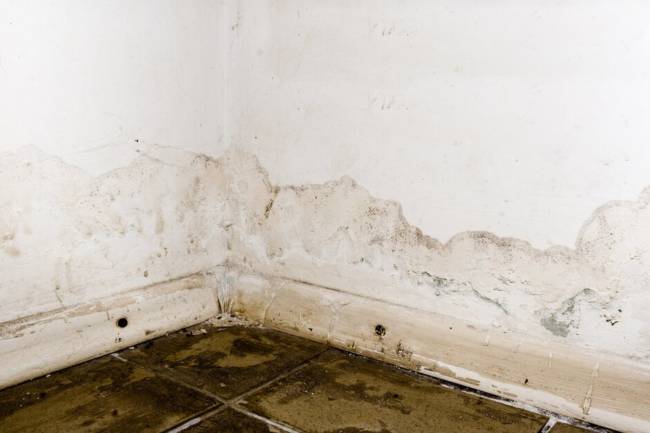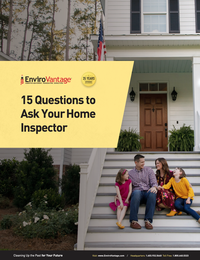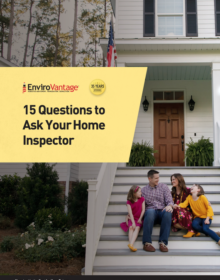Do I Really Need Professional Mold Testing?

Maybe you’ve found mold in your house, or there’s a lingering musty smell in the basement that won’t go away, no matter how many air fresheners you spray around. Perhaps you just bought a house (congratulations!), and suspected mold was found during the inspection. In any of these situations, you definitely want a mold inspection, but do you need to hire a certified mold testing specialist? Read on for a comprehensive guide to professional mold testing.
What is Mold?
Why is Professional Mold Testing Important?
Mold Inspection vs Mold Testing
Types of Mold You Can Find</a
When to Get Professional Mold Testing
How to Find Hidden Mold
Mildew vs. Mold: What’s the Difference?
How Much Does Mold Testing Cost?
How to Find the Right Mold Testing Service
FAQs About Mold Testing
What is Mold?
Let’s start with the basics. Mold is a fungus that forms when excessive moisture is present. It’s commonly found in basements, attics, bathrooms, air ducts, and other places that are often exposed to moisture. Mold can also grow on exterior siding and outdoor surfaces. Most molds are black, green, or gray.
Why Is Professional Mold Testing Important?
Accuracy/Verification
If you suspect mold in your home but aren’t sure, a residential mold testing specialist can find out. If mold is present you may want to identify the strain because some molds, like Stachybotrys chartarum, are highly toxic. It can be identified by its black color, but there are also other types of molds that are black and non-toxic.
Adverse Health Effects
Mold can cause allergy-like symptoms like itchy, watery or red eyes, and asthma. It can also cause respiratory issues and itchiness in dogs and cats. Other common side effects include:
- Dry cough
- Skin rashes
- Sore/scratchy throat
- Sinusitis
- Wheezing
- Pneumonia
Mold Inspection vs. Mold Testing
Mold Inspection
A mold inspector may be able to confirm mold from photos. However, it’s most common that an investigator will come to the house to identify and locate the source of the mold. A mold remediation contractor may offer to visually inspect the area free of charge. Some may charge up to $300 for a visual inspection but will deduct that amount from the final invoice if they are hired.
Mold Testing
If the mold inspector deems it necessary, they may conduct scientific air sampling and collect physical samples to be analyzed. It will take about 24 hours for results, and the mold inspector will be able to recommend next steps.
Types of Molds You Can Find
The most common types of mold types found in New England homes are:
- Aspergillus/Penicillium: Commonly referred to as ASP/PEN on a mold inspection report, this is the most common mold species to appear in indoor air samples. ASP/PEN spores are typically allergenic and not toxic but people with weakened immune systems may suffer from exposure.
- Cladosporium: This type of mold is often found within the home, and in high concentrations can be harmful. This is the most common form found in attic mold situations.
- Stachybotrys Chartarum: Also known as black mold, this is a toxic type of growth that typically results from a continuous water leak over an extended period. This type of fungus requires 100% water saturation and constant moisture to thrive — as opposed to other forms of mold that only require high levels of relative humidity.
When to Get Professional Mold Testing
Although mold testing isn’t always necessary, like when mold is clearly visible, there are many situations when professional mold testing is beneficial. Here are some of those situations:
- If you or a family member (or pets) have long-lasting allergy-like symptoms and don’t know the cause.
- If you or a family member continuously smell a moldy or musty odor and can’t locate the source.
- If you see mold growth in one room and know if it’s impacting other areas of the home.
How to Find Hidden Mold
If you suspect mold but can’t find it, you can check in places that typically have moisture buildup like under sinks, behind toilets, and around AC units and air ducts. You can also check for plumbing leaks, check inside air ducts, and around washing machine units. You can also hire an official mold inspector to help identify the source of the mold.
Mildew vs. Mold: What’s the Difference?
Both mildew and mold are fungi that grow from excess moisture and can cause allergy-line symptoms. Mold can be fuzzy or slimy and mildew is flat, fuzzy, or powdery. [V11] Mildew is always found on the surface, while mold can grow under the surface of things with extensive moisture. Mold can be variety of colors, but mildew is always white or gray. Although both have a strong musty smell, mold is more pungent. Mildew is usually less harmful than mold but can grow on plants and be harmful when consumed. Mold is harder to remove.
How Much Does Mold Testing Cost?
The typical cost is for air sampling is anywhere from $500 to $1,500 depending on the extent of the survey. You may not need testing if there is visible mold in your house. If there is visible mold, you should contact a mold remediation company.
If you aren’t sure whether you have mold and need testing, you can still call a remediation company, but they may refer you to a third-party mold inspector to avoid a conflict of interest since they would be both testing and performing the work.
How to Find the Right Mold Testing Service
Finding the right mold testing services doesn’t need to be a daunting task. You want to be sure the mold testing service uses a scientific lab that follows all ordinances and regulations. You can also ask if they are affiliated with any related associations, such as the American Council for Accredited Certification and/or the Indoor Air Quality Association or the American Industrial Hygiene Association. You also want to make sure that the mold inspector will write a work plan following the Institute of Inspection Cleaning and Restoration Certification IICRC S520 Standard or other nationally recognized standards.
FAQs About Mold Testing
Q: Can I test for and remove mold myself?
A: It’s not recommended for you to test and remove mold yourself. DIY kits don’t provide an accurate picture of the mold spore activity within the home. Mold investigation and testing by a certified inspector will provide better and more accurate information.
Q: My house has mildew. Now what?
A: If you’re sure that your house has mildew and not mold, you can remove it yourself. Try these tips from Reader’s Digest, which include scrubbing with white vinegar, adding baking soda and vinegar to washing and drying cycles, and diluting bleach to clean painted surfaces.
Q: My house has mold. Now what?
A: You should contact a remediation company, who should identify the root cause (if not already known). You should avoid the area of the house with the mold, if possible.
Q: How long does a professional mold inspection take?
A: A professional inspection can take anywhere from a half hour to a few hours depending on the extend of the inspection.
Q: How long does mold testing take?
A: Typically takes a few days, but many inspectors use labs that have a 24-hour turnaround.
Q: How common is mold?
A: Mold is very common in homes and buildings and is an indicator of high humidity, moisture, and lingering dampness.
Q: How do you keep mold out of a house?
A: To keep mold out of a house, eliminate the source: moisture. Make sure to routinely check and fix any leaks, clean up excessive moisture, and keep areas dry by using a self-draining dehumidifier capable of maintaining a relative humidity between 35-50%.
Q: If I have excessive moisture and/or leaks, does that always mean I will have mold?
A: Not necessarily, but don’t wait to find out. Clean up your moisture and fix leaks!
If you suspect or know that you have mold in your home, it’s important to have it inspected and potentially tested. Mold remediation is a specialized type of cleaning and should be performed by experts who follow industry standards.
Contact EnviroVantage today for your mold removal needs.

Are you ready to buy or sell your home?
Whether your offer has just been received or you’re thinking about putting your house up for sale, consider these 15 important questions to ask your home inspector.

Questions?
We’d be happy to answer them — and talk about how EnviroVantage can support your next abatement, demolition, or remediation project.